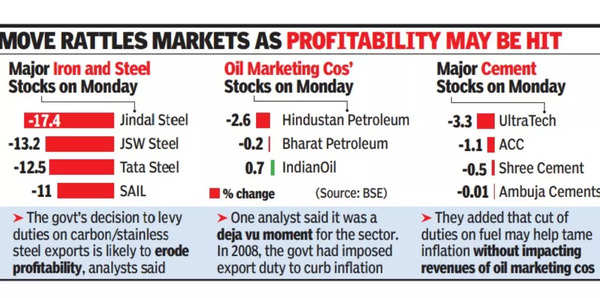[ad_1]
The decision to either increase or introduce export duty on some iron & steel products was taken to help domestic users of these and rein in inflation. But most analysts see the development as a negative for stocks of iron & steel producers. The cutting of duties on petrol and diesel was also to tame inflation without in any way impacting the revenues of OMCs. Since OMCs are unlikely to hike prices of petrol and diesel immediately, under-recoveries would continue, which would impact their profitability, analysts said.
Among the iron & steel makers, Jindal Steel crashed over 17%, while JSW Steel lost a little over 13%, Tata Steel 12.5% and SAIL 11%. As a result, BSE’s metal index lost 8.3% to close at a more than one-year low level. As for oil companies, IOCL, which has an advantage in terms of refining, closed marginally higher, while HPCL, which has strong marketing leverage, closed 2.6% lower.

According to a report by domestic brokerage Edelweiss, the government’s decision to levy duties on carbon/stainless steel exports is likely to erode the profitability of the sector significantly. “The move has throttled the recent rise of the Indian steel industry in the global arena,” the report noted.
A report by Prabhudas Lilladher, another domestic brokerage, described the situation as deja vu moment for the sector. “The event reminds of 2008 when the UPA government imposed export duty to curb inflation as steel prices crossed $1,000/tonne in the wake of massive global liquidity and strong demand.” It admitted that it may not be correct to join the dots by linking the past event with the current one.
The reaction to the decision to change duties and levies left bond players a divided lot. According to a bond fund manager, no immediate enhancement in government’s borrowing is expected since any such increase usually comes nearer to the end of the fiscal year. And given that still 10 months are left in the year, several variables would decide the final borrowing figure, the fund manager said.
[ad_2]
Source link
